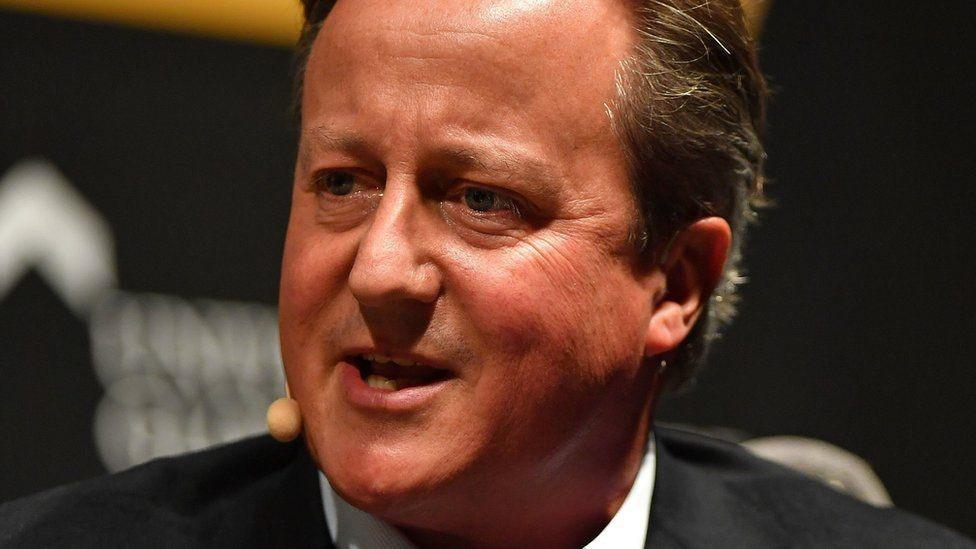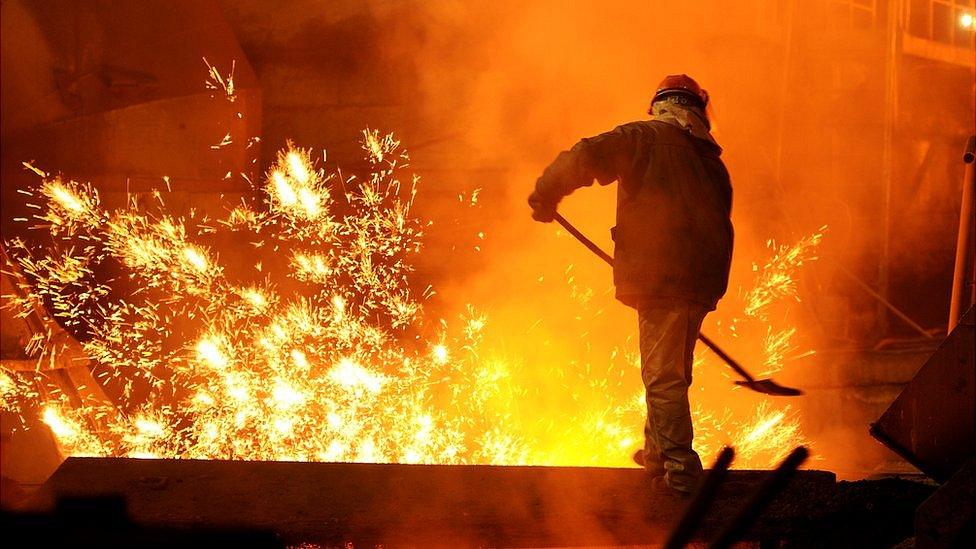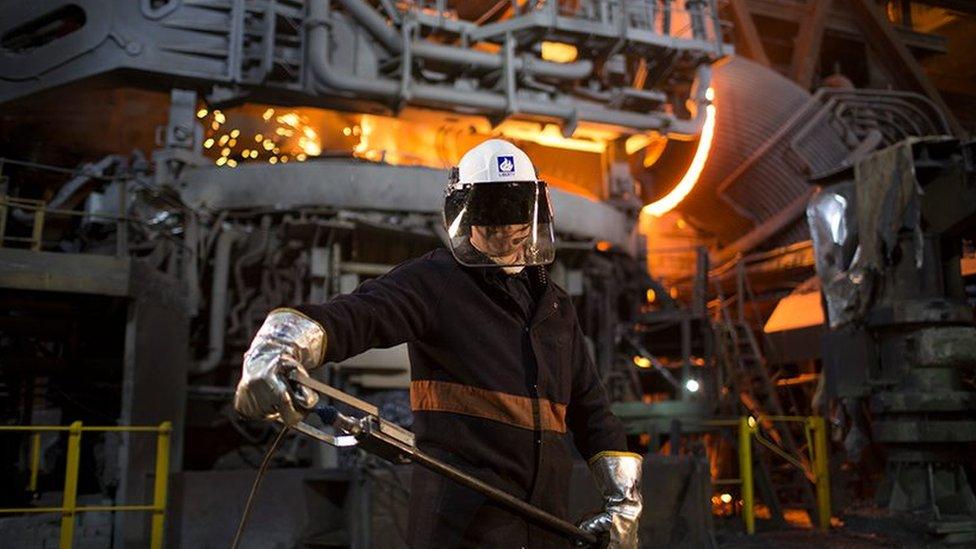Liberty Steel boss: Plants won't shut on my watch
- Published
- comments
Sanjeev Gupta: "UK steel plants will not close on my watch"
Liberty Steel owner Sanjeev Gupta has claimed that none of its plants will shut "under my watch" as he races to refinance his business after the collapse of financial backer Greensill.
He said taking on the UK plants had been a "tough journey" and a "labour of love", but he would not walk away.
Mr Gupta was rebuffed by the UK government after asking for £170m.
Some investors have also begun legal action to have parts of his metals group wound up.
But Mr Gupta said he and GFG Alliance, Liberty Steel's parent company, were "not waiting for anybody" and were "doing what we can to help our businesses".
"Our overall global operations are profitable, we have refinancing offers, we will refinance, and we will support our UK business also," Mr Gupta told the BBC.
"None of my steel plants under my watch will be shut down," he said.
Liberty Steel has about 3,000 workers at sites including Rotherham, Motherwell and Newport. A further 2,000 work for GFG Alliance in other UK metals and engineering businesses.
Prime Minister Boris Johnson said he was "very hopeful" that the plants could be saved and that Britain needed a strong steel industry..
He said that Business Secretary Kwasi Kwarteng was in "daily contact" with GFG.
"I think British steel is a very important national asset. I think the fact that we make steel in this country is of strategic long-term importance," he said.
"We have learned during the pandemic that it is not a good idea to be excessively reliant in times of trouble on imports of critical things," he added.
"It would be crazy if we were not to use this post-Brexit moment not to use the flexibility we have to buy British steel. So that's want we want to do."
'Further questions'
The GMB union said Mr Gupta's comments were "very welcome" but making guarantees without showing financial backing "just raises further questions".
"To be able to give these guarantees with such confidence you have to assume he's found the financing required to keep the company going," said Ross Murdoch, GMB national officer.
"If that's the case he needs to let people know and stop workers worrying about their jobs."



Time is ticking for Sanjeev Gupta's business empire.
The collapse of his main source of finance, Greensill Capital, leaves him dangerously exposed and in a race to find new sources of cash.
GFG Alliance, the group of companies he runs, owes Greensill about $5bn, according to GFG's own evidence to court when Greensill was put into administration in February.
GFG also told the court that Greensill's collapse would put it at risk of insolvency. Since then, it has been something of a phoney war, with little sign of the Greensill debacle causing greater damage.
Now, however, winding-up petitions have been lodged against some of Mr Gupta's UK companies.
The investors that gave money to Greensill want their money back and Mr Gupta's business empire is firmly in their sights.
On the Today programme on Thursday, Mr Gupta said his companies were ready to defend their position in court and they were confident their loan deal with Greensill was a long-term arrangement that could not suddenly be terminated.
He must now hold off the winding-off threats for long enough - or defeat them - while he finds sources of finance to replace Greensill.
This might mean the sale of assets, or new borrowing, although the process is complicated by much of the Gupta business empire already being pledged as collateral against the loans advanced by Greensill.
It will be a complicated and time-consuming business - and Mr Gupta may not be given much time.

Mr Gupta said steel prices were at a 13-year peak, while aluminium prices were also high.
He said GFG had been streamlining the business and had a "huge amount of interest from new financiers who are willing to back us" and refinance the group.
He said it would take time to sort things out, but a short-term solution was an initiative called "Project Athena" which required each plant to make daily reports on how they were conserving cash.
On Wednesday, Citigroup, acting on behalf of the investment bank Credit Suisse, began legal action in London's insolvency court to recoup unpaid debts from Mr Gupta's GFG Alliance.
Mr Gupta said it was "natural to some degree that lenders want to protect their own position", but that GFG's position was that it had agreed debts with Greensill for three years and they were not due.
He said GFG was having "positive discussions" with Grant Thornton, the administrators for Greensill.
"It makes no sense for them, or any of the creditors, to destroy jobs, but more importantly to destroy value, because that is the value which will give them their recovery," Mr Gupta said.

Mr Gupta said former Prime Minister David Cameron had not lobbied on GFG's behalf
Mr Gupta's business model centred on buying up failing or mothballed steel and aluminium plants around the world and starting production again, with the help of his main backer Greensill.
In 2015, production restarted at the Liberty Steel plant in Newport, and in 2016 Liberty reopened and the Dalzell steel mill in Scotland. In 2017, Liberty acquired Tata's speciality steels business and expanded into Australia. In the following year it expanded into the US.
Mr Gupta said: "The UK has been a tough journey. It's because the UK steel industry has been decimated for decades. So that journey definitely has been a labour of love."
"But I'm committed to my UK steel plants. I started them, I believe in them, they have a great future. We've saved thousands of jobs here. We've shown that economically those businesses can work," he said.
Mr Gupta added that former Prime Minister David Cameron, who acted as an advisor for Greensill, had not made representations on behalf of GFG Alliance.
"I've not spoken to him, I think, since he was Prime Minister," Mr Gupta said.
Mr Cameron was cleared by a watchdog last week which looked at whether he had followed lobbying rules.
Related topics
- Published31 March 2021

- Published30 March 2021
